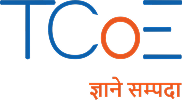EV 3-Wheeler Technician Course
Step into the fast-growing world of electric mobility with our EV 3-Wheeler Technician Course — your gateway to mastering the future of urban transportation! This course takes you under the hood of electric auto-rickshaws and cargo 3-wheelers, revealing how they’re revolutionizing last-mile connectivity and sustainable transport.
From battery technology and motor systems to charging, control units, and fault diagnosis, you’ll gain a complete understanding of how EV 3-wheelers work, perform, and are serviced. Whether you aim to become a skilled technician, engineer, or entrepreneur in the EV ecosystem, this course will empower you with real-world knowledge, hands-on insights, and job-ready skills to thrive in the booming electric vehicle industry.
- 72 Hours (2 hours/day x 6 days/week x 6 weeks) OR at your own pace
- Hindi, English
- Learn & Get Certified
- Basic & Intermediate
- Hands-On Training
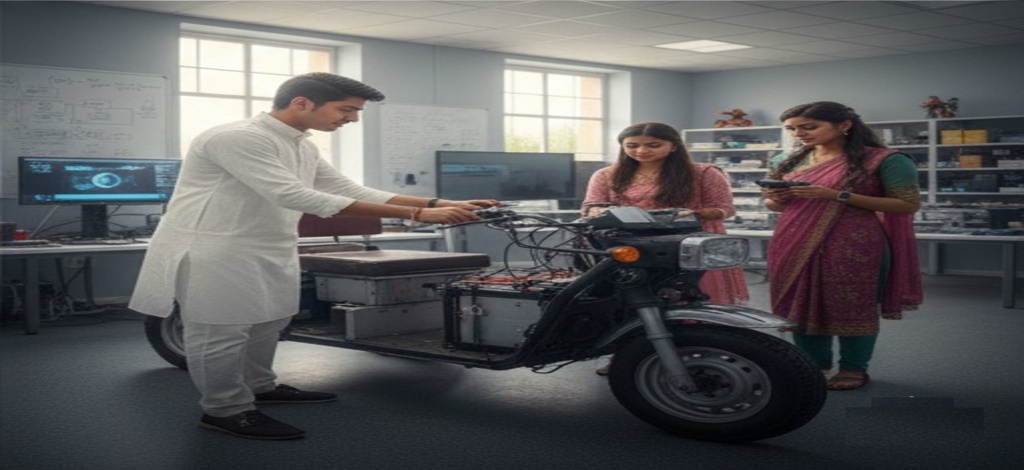
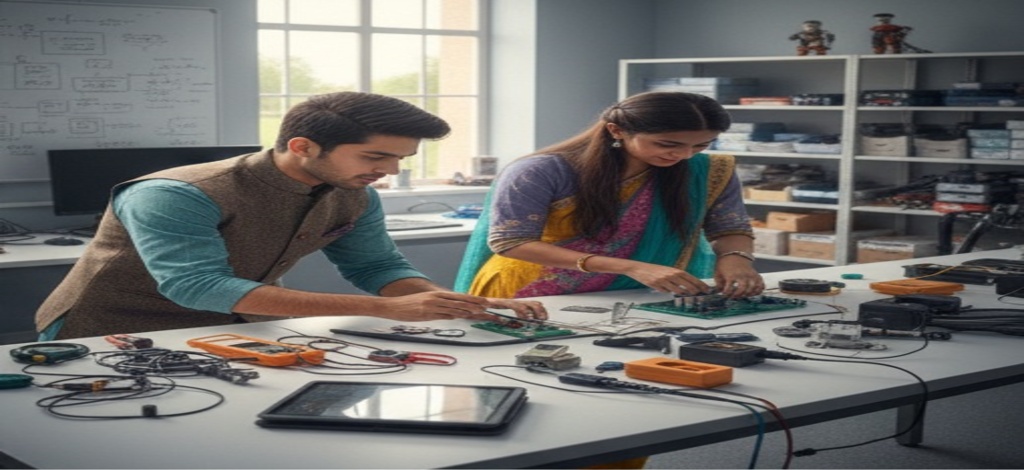
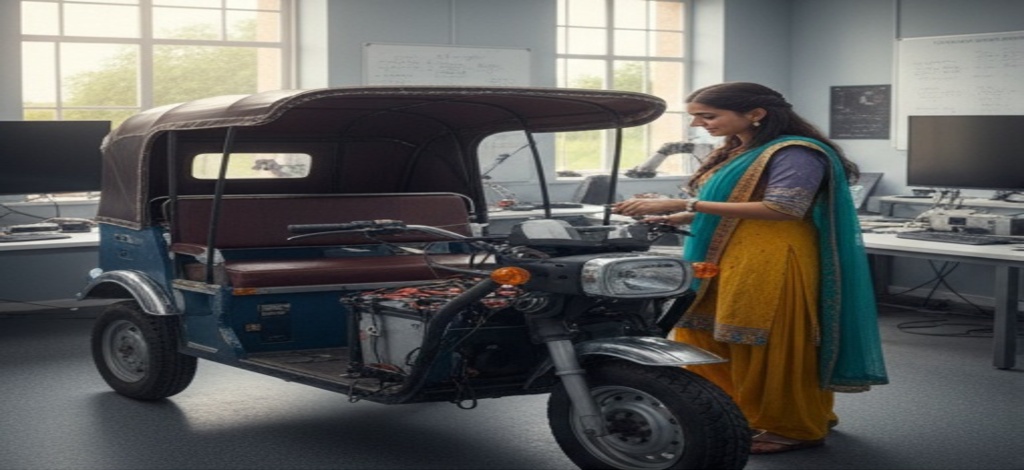
Online Course Fees
Offline Course Fees
About this course
EV 3-Wheeler Technician Course provides an introduction to the design, technology, and operation of electric three-wheeler vehicles. The course covers the fundamentals of electric mobility, including battery systems, electric motors, power electronics, vehicle dynamics, and charging infrastructure. Students will also explore sustainability, government policies, and real-world applications of EV 3-wheelers in urban transport and logistics. Hands-on activities and case studies help learners understand the practical challenges and innovations driving this growing sector.
This course provides essential knowledge and practical training to build industry-relevant skills.
- Online Course Fees: ₹3500, ₹2500 (incl. GST) (Excluding tools & equipment cost)
- Offline Course Fees: ₹13500, ₹12000 (incl. GST) (Excluding tools & equipment cost)
- Certification: TCoE
- Duration: 72 Hours (2 hours/day x 6 days/week x 6 weeks) OR at your own pace
What you'll learn
After this course you will learn:
- Fundamentals of EV 3-Wheelers: Understand the structure, working principles, and unique design of passenger and cargo 3-wheelers.
- Battery Systems & Management: Learn about battery types, configurations, charging methods, and battery management systems (BMS).
- Motor & Controller Operations: Explore different electric motors used in 3-wheelers and how controllers regulate performance and efficiency.
- Powertrain & Energy Flow: Study how power is transmitted from the battery to the wheels, optimizing torque and speed.
- Diagnostics & Troubleshooting: Gain hands-on knowledge in identifying and fixing common electrical and mechanical faults.
- Charging Infrastructure: Discover various charging techniques, connectors, and safety standards for 3-wheelers.
- Design & Component Integration: Learn how key components like brakes, suspension, and chassis are adapted for electric drive systems.
- Performance Testing & Safety: Understand key performance parameters, testing methods, and safety protocols for EV operation.
Course Content
Why take this course?
This course prepares you with hands-on skills to service, diagnose, and maintain electric three-wheelers used in passenger transport and last-mile logistics. You will learn about EV powertrains, battery systems, motors, controllers, charging systems, and safety procedures specific to 3-wheeler platforms. With the rapid adoption of electric autos and cargo vehicles in urban and semi-urban areas, skilled technicians are in high demand. This course equips you with job-ready expertise for service centers, fleet operators, and EV manufacturers, supporting the growth of affordable and sustainable electric mobility.
How to use online TCoE platform?
Tools and Equipment required
National Skill Development Mission
Module-1: Introduction to Electric Vehicles and Electric Vehicles market
- This module introduces learners to the fundamentals of electric vehicles (EVs), focusing on 3-wheeler EVs.
- It covers the working principles, key components, and types of electric vehicles, highlighting their advantages over conventional vehicles.
- Additionally, the module provides an overview of the global and Indian EV market, trends, adoption drivers, and future opportunities, helping students understand the growing importance and potential of electric mobility.
Module-2: Introduction of equipment and tools used
- This module familiarizes learners with the essential equipment and tools required for assembling, maintaining, and troubleshooting 3-wheeler electric vehicles.
- It covers hand tools, multimeters, battery testers, torque wrenches, diagnostic devices, and workshop safety equipment.
- Students will gain practical knowledge of handling, operating, and maintaining these tools, laying the foundation for hands-on work with electric vehicle systems.
Module-3: Cell fundamentals and battery design for E-3 Wheeler
- This module introduces learners to the basics of electrochemical cells and their role in electric vehicles, with a focus on 3-wheelers.
- It covers battery types, cell construction, capacity, voltage, and energy density, along with principles of battery design, including series and parallel configurations.
- Students will also learn about battery management systems (BMS) and safety considerations, enabling them to understand, select, and design efficient battery packs for E-3 wheeler applications.
Module-4: Motor and motor controller for E-3 Wheeler
- This module introduces learners to the types of motors used in electric 3-wheelers, including DC, BLDC, and induction motors, along with their working principles and applications.
- It also covers motor controllers, explaining how they regulate speed, torque, and direction of the vehicle.
- Students will learn about integration of motors with controllers, efficiency considerations, and safety aspects, enabling them to understand and manage the drive system of an electric 3-wheeler effectively.
Module-5: EV-3 Wheeler electric system design
- This module focuses on designing the complete electric system of a 3-wheeler vehicle.
- It covers the integration of batteries, motors, motor controllers, wiring, and auxiliary components to create a functional and efficient electric drive system.
- Students will learn principles of power distribution, system sizing, energy management, and safety considerations, enabling them to design a reliable and optimized electric system for E-3 wheeler applications.
Module-6: EV-3 Wheeler Assembly
- This module guides learners through the step-by-step assembly of a 3-wheeler electric vehicle.
- It covers mounting the chassis, integrating the battery pack, installing the motor and motor controller, and connecting electrical and auxiliary systems.
- Emphasis is placed on proper alignment, secure connections, safety practices, and quality checks, enabling students to assemble a fully functional electric 3-wheeler ready for testing and operation.
Module-7: EV-3 Wheeler Testing and Repair
- This module focuses on evaluating the performance and reliability of an electric 3-wheeler after assembly.
- Learners will explore techniques for testing electrical systems, battery performance, motor functionality, and overall vehicle operation.
- The module also covers troubleshooting common issues, identifying faults, and performing repairs safely and efficiently.
- By the end, students will be able to ensure their E-3 wheeler is fully functional, optimized, and ready for real-world use.
ENROLL TODAY & GET 30% OFF ON ALL COURSES
Your Future Can’t Wait, Enroll Now and Save 30% On All Courses.
Related Courses
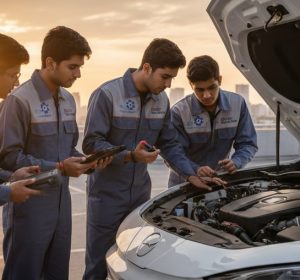
Battery System Assembly Operator
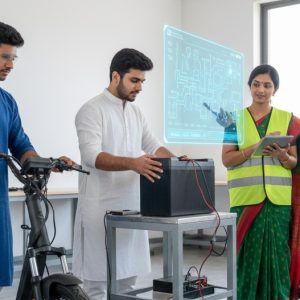
EV Scooter Technician
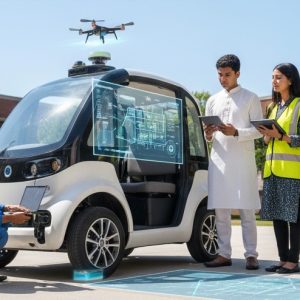
Electric Vehicles Engineer
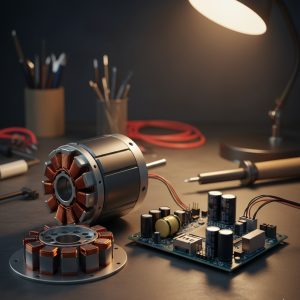
EV Motors Technician
See what our students have to say
With over a decade of experience, our mission is to produce future-ready skilled resources.
Battery Management System (BMS) in EV 3-Wheelers
The Battery Management System (BMS) is the brain of an electric 3-wheeler’s power system. It continuously monitors and controls the battery’s performance — ensuring each cell operates safely and efficiently. In this topic, you’ll learn how the BMS tracks parameters like voltage, temperature, current, and state of charge (SOC) to prevent overcharging or deep discharge.
You’ll also explore how intelligent BMS design improves vehicle range, battery lifespan, and safety, along with fault detection and communication with the motor controller. This topic bridges both hardware and software aspects, preparing you to understand, service, and even optimize the energy heart of an EV 3-wheeler.
Job Opportunities
Here are some interesting job opportunities after completing the Embedded Software Engineer course:
EV Service & Maintenance Technician
Work with electric 3-wheeler fleets or service centers to maintain, repair, and troubleshoot key systems like batteries, motors, and controllers.EV Assembly Line Technician
Join manufacturing units to assist in the assembly, wiring, and quality testing of electric 3-wheelers and their components.Battery Testing & Maintenance Engineer
Specialize in battery performance evaluation, charging cycle optimization, and BMS calibration for passenger and cargo EVs.Motor & Controller Calibration Engineer
Work on tuning and testing electric motors and controllers for better energy efficiency and smoother performance.EV Product Development Assistant
Support engineers in designing and improving 3-wheeler models, integrating new technologies like regenerative braking or IoT-based monitoring.Quality Assurance & Testing Executive
Ensure every EV meets performance, durability, and safety standards before hitting the road.
Frequently asked questions
What is this course about?
This course provides in-depth knowledge of electric 3-wheelers — including their design, working, battery systems, motor controllers, and maintenance practices. It’s perfect for anyone looking to start or advance a career in the EV sector.
Who can join this course?
Students, diploma holders, engineers, mechanics, or EV enthusiasts — anyone interested in understanding or working with electric 3-wheelers can join. No prior EV experience is required!
What practical skills will I gain?
You’ll learn to inspect, service, and troubleshoot 3-wheeler EV systems — including batteries, motors, and controllers — through real-world case studies and practical demonstrations.
Will this course help me get a job?
Yes! The EV industry is expanding rapidly, and trained professionals are in high demand. This course prepares you for roles like EV Technician, Service Engineer, Design Assistant, or Fleet Maintenance Supervisor.
How long is the course, and what’s the mode of learning?
The course duration and format can vary, but it typically includes a blend of interactive lectures, video demonstrations, and hands-on sessions — available in both online and offline formats.
